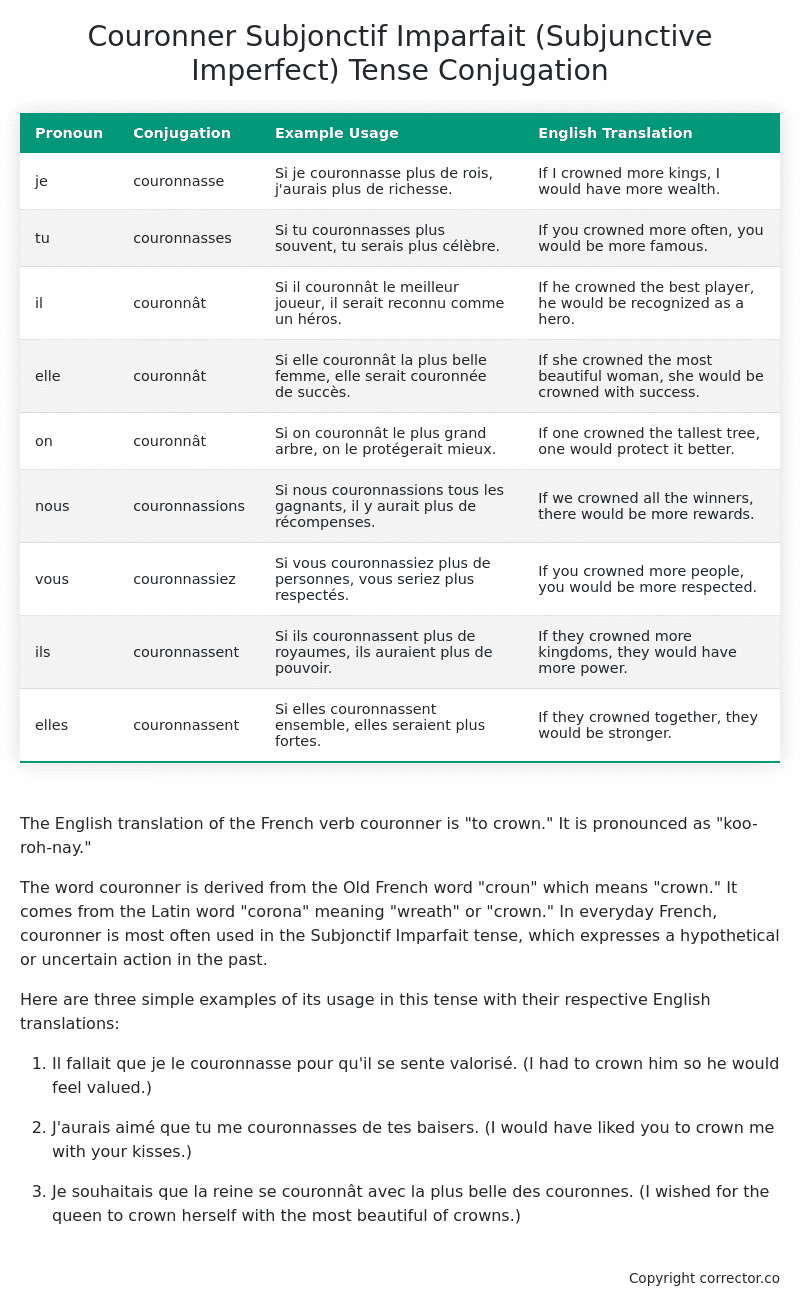Subjonctif Imparfait (Subjunctive Imperfect) Tense Conjugation of the French Verb couronner
Introduction to the verb couronner
The English translation of the French verb couronner is “to crown.” It is pronounced as “koo-roh-nay.”
The word couronner is derived from the Old French word “croun” which means “crown.” It comes from the Latin word “corona” meaning “wreath” or “crown.” In everyday French, couronner is most often used in the Subjonctif Imparfait tense, which expresses a hypothetical or uncertain action in the past.
Here are three simple examples of its usage in this tense with their respective English translations:
-
Il fallait que je le couronnasse pour qu’il se sente valorisé. (I had to crown him so he would feel valued.)
-
J’aurais aimé que tu me couronnasses de tes baisers. (I would have liked you to crown me with your kisses.)
-
Je souhaitais que la reine se couronnât avec la plus belle des couronnes. (I wished for the queen to crown herself with the most beautiful of crowns.)
Table of the Subjonctif Imparfait (Subjunctive Imperfect) Tense Conjugation of couronner
| Pronoun | Conjugation | Example Usage | English Translation |
|---|---|---|---|
| je | couronnasse | Si je couronnasse plus de rois, j’aurais plus de richesse. | If I crowned more kings, I would have more wealth. |
| tu | couronnasses | Si tu couronnasses plus souvent, tu serais plus célèbre. | If you crowned more often, you would be more famous. |
| il | couronnât | Si il couronnât le meilleur joueur, il serait reconnu comme un héros. | If he crowned the best player, he would be recognized as a hero. |
| elle | couronnât | Si elle couronnât la plus belle femme, elle serait couronnée de succès. | If she crowned the most beautiful woman, she would be crowned with success. |
| on | couronnât | Si on couronnât le plus grand arbre, on le protégerait mieux. | If one crowned the tallest tree, one would protect it better. |
| nous | couronnassions | Si nous couronnassions tous les gagnants, il y aurait plus de récompenses. | If we crowned all the winners, there would be more rewards. |
| vous | couronnassiez | Si vous couronnassiez plus de personnes, vous seriez plus respectés. | If you crowned more people, you would be more respected. |
| ils | couronnassent | Si ils couronnassent plus de royaumes, ils auraient plus de pouvoir. | If they crowned more kingdoms, they would have more power. |
| elles | couronnassent | Si elles couronnassent ensemble, elles seraient plus fortes. | If they crowned together, they would be stronger. |
Other Conjugations for Couronner.
Le Present (Present Tense) Conjugation of the French Verb couronner
Imparfait (Imperfect) Tense Conjugation of the French Verb couronner
Passé Simple (Simple Past) Tense Conjugation of the French Verb couronner
Passé Composé (Present Perfect) Tense Conjugation of the French Verb couronner
Futur Simple (Simple Future) Tense Conjugation of the French Verb couronner
Futur Proche (Near Future) Tense Conjugation of the French Verb couronner
Plus-que-parfait (Pluperfect) Tense Conjugation of the French Verb couronner
Passé Antérieur (Past Anterior) Tense Conjugation of the French Verb couronner
Futur Antérieur (Future Anterior) Tense Conjugation of the French Verb couronner
Subjonctif Présent (Subjunctive Present) Tense Conjugation of the French Verb couronner
Subjonctif Passé (Subjunctive Past) Tense Conjugation of the French Verb couronner
Subjonctif Imparfait (Subjunctive Imperfect) Tense Conjugation of the French Verb couronner (this article)
Subjonctif Plus-que-parfait (Subjunctive Pluperfect) Tense Conjugation of the French Verb couronner
Conditionnel Présent (Conditional Present) Tense Conjugation of the French Verb couronner
Conditionnel Passé (Conditional Past) Tense Conjugation of the French Verb couronner
L’impératif Présent (Imperative Present) Tense Conjugation of the French Verb couronner
L’infinitif Présent (Infinitive Present) Tense Conjugation of the French Verb couronner
Struggling with French verbs or the language in general? Why not use our free French Grammar Checker – no registration required!
Get a FREE Download Study Sheet of this Conjugation 🔥
Simply right click the image below, click “save image” and get your free reference for the couronner Subjonctif Imparfait tense conjugation!

Couronner – About the French Subjonctif Imparfait (Subjunctive Imperfect) Tense
Formation
Common Everyday Usage Patterns
Interactions with Other Tenses
Subjonctif Présent
Indicatif Passé Composé
Conditional
Conditional Perfect
Summary
I hope you enjoyed this article on the verb couronner. Still in a learning mood? Check out another TOTALLY random French verb conjugation!


